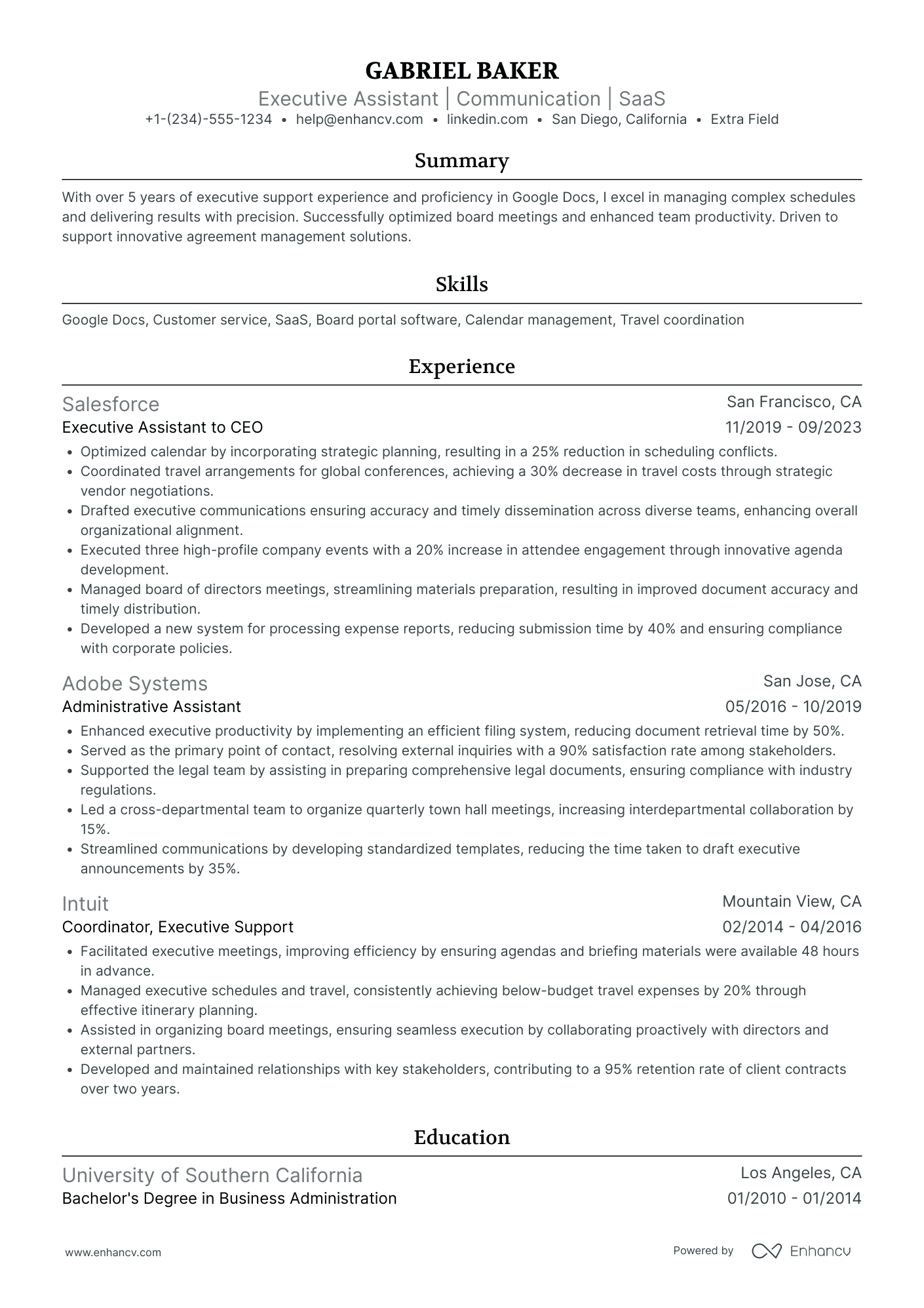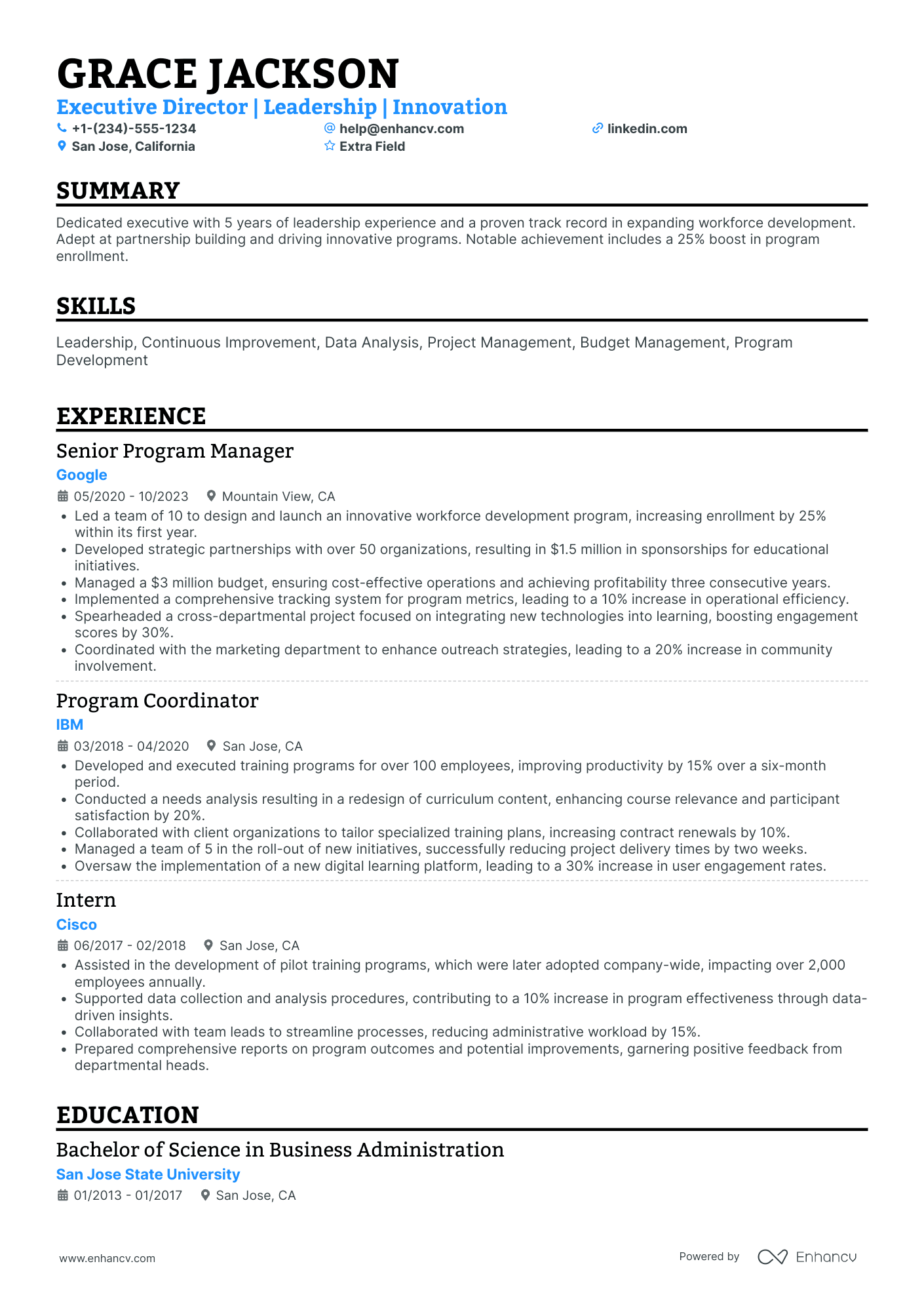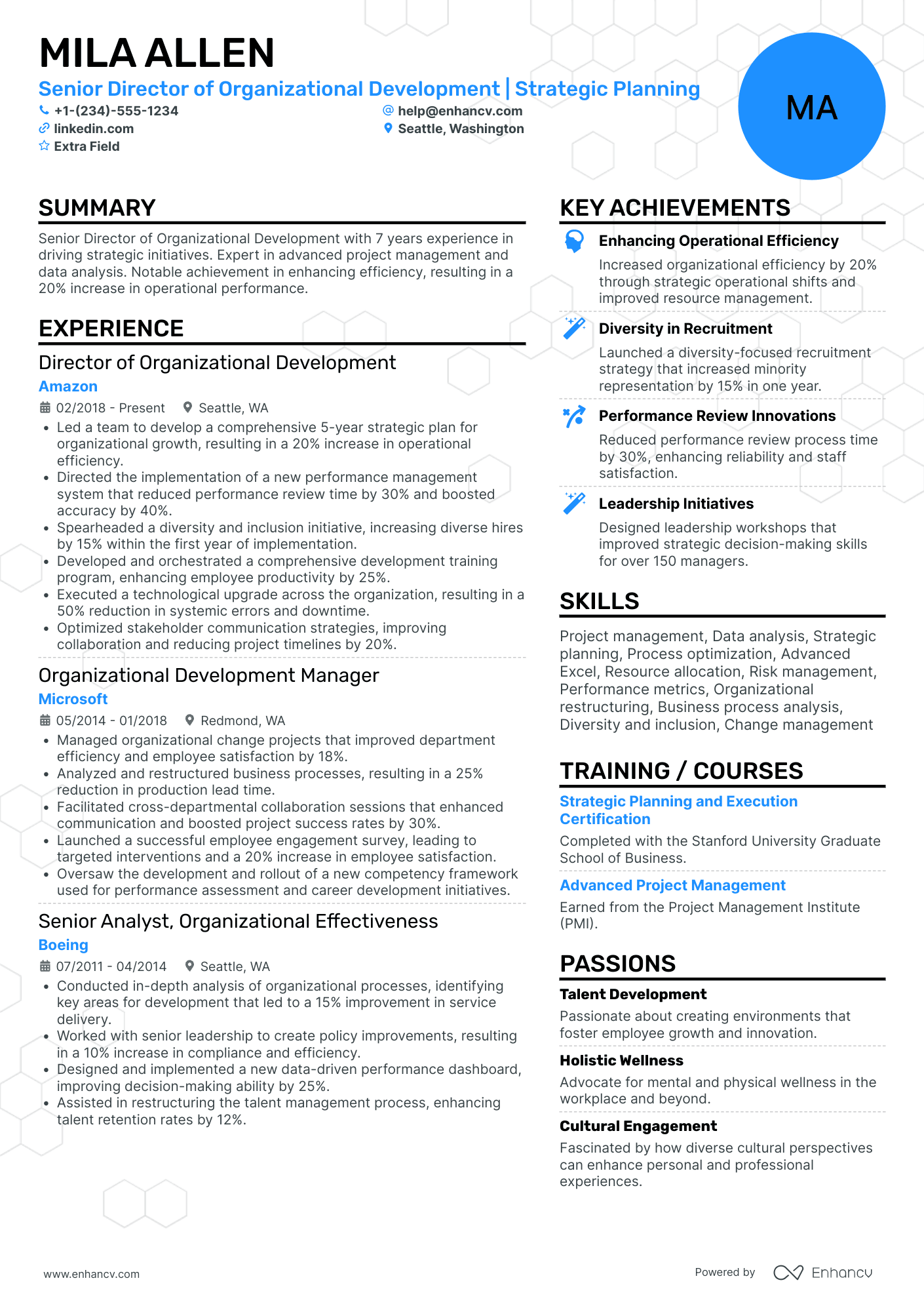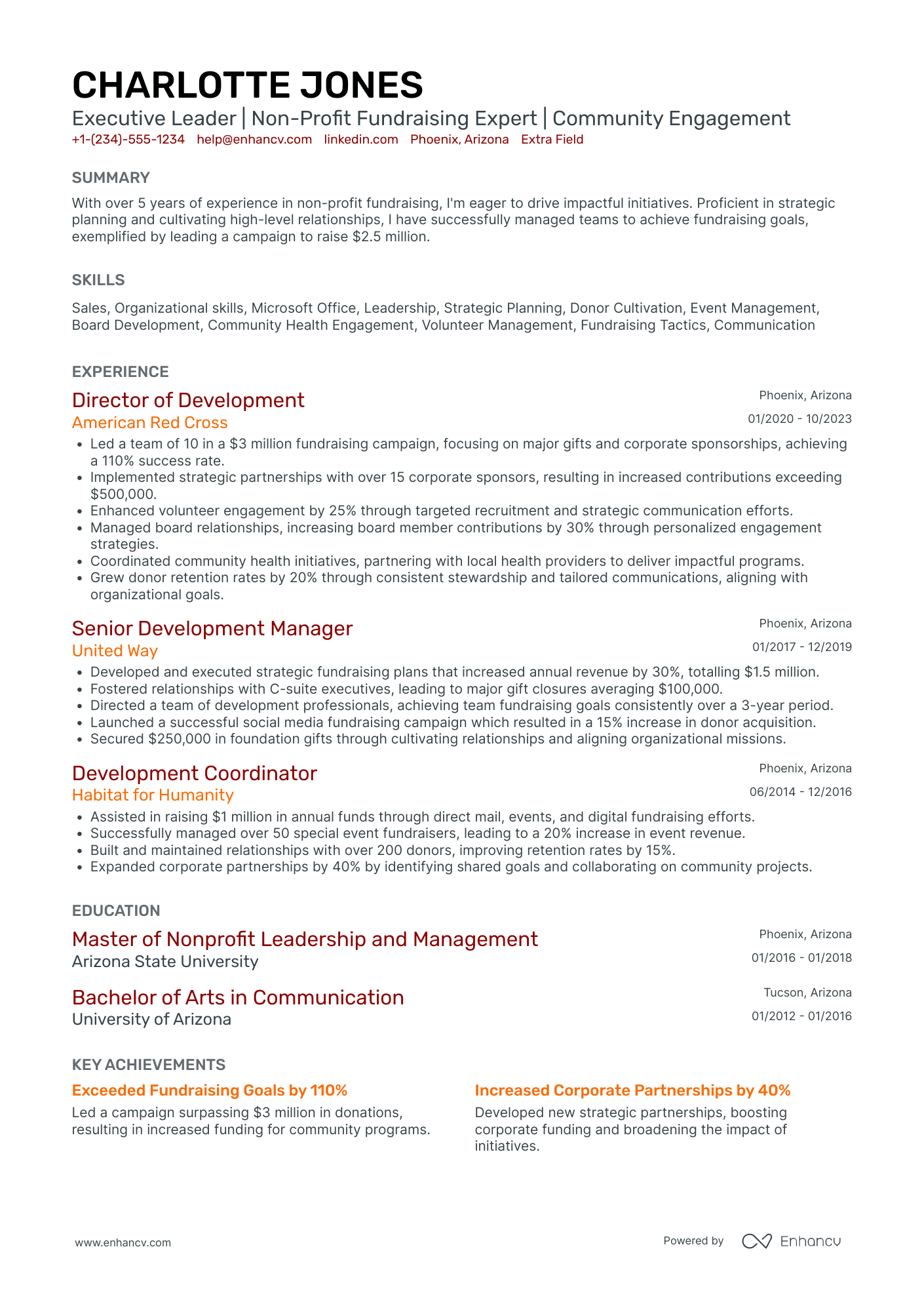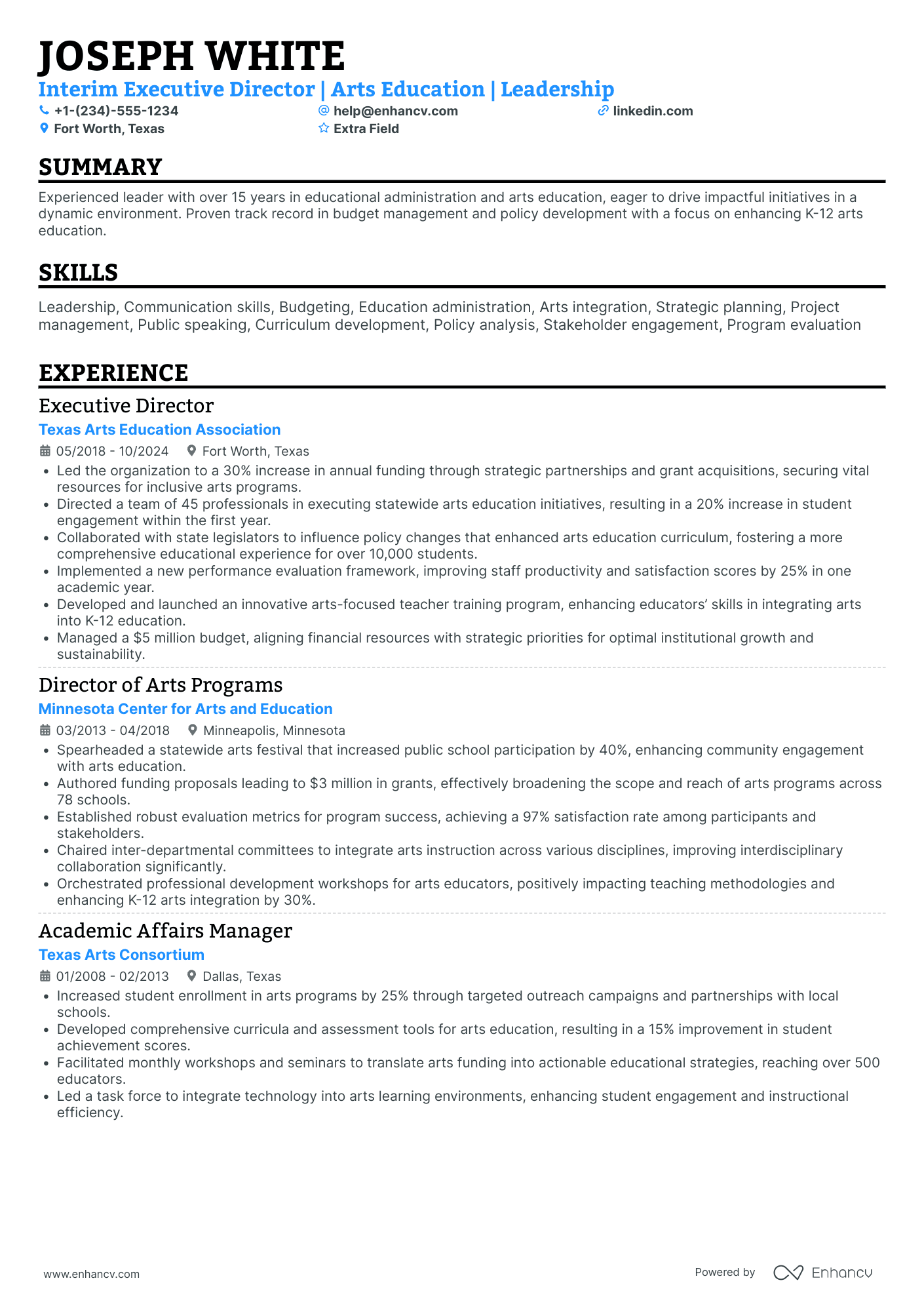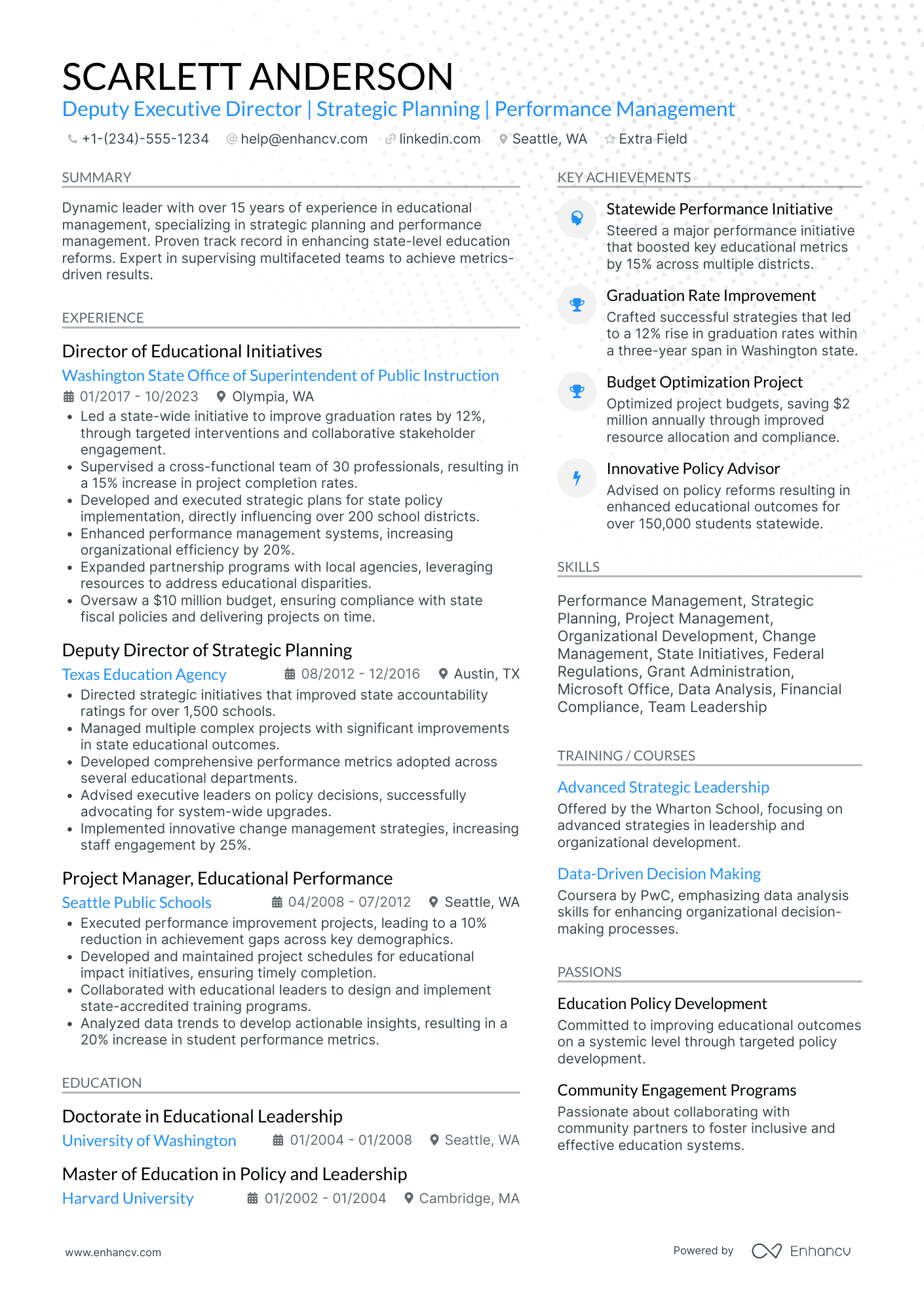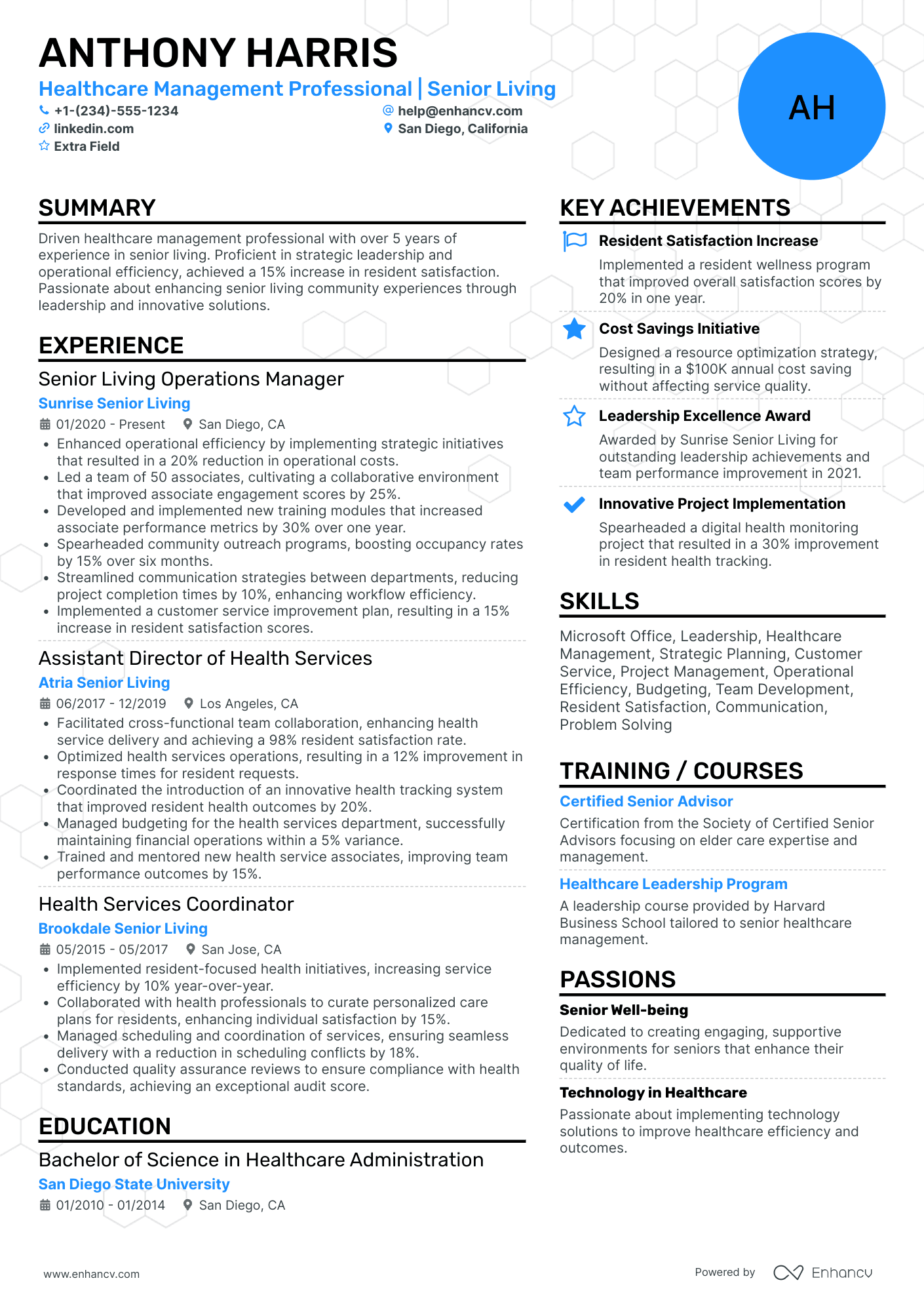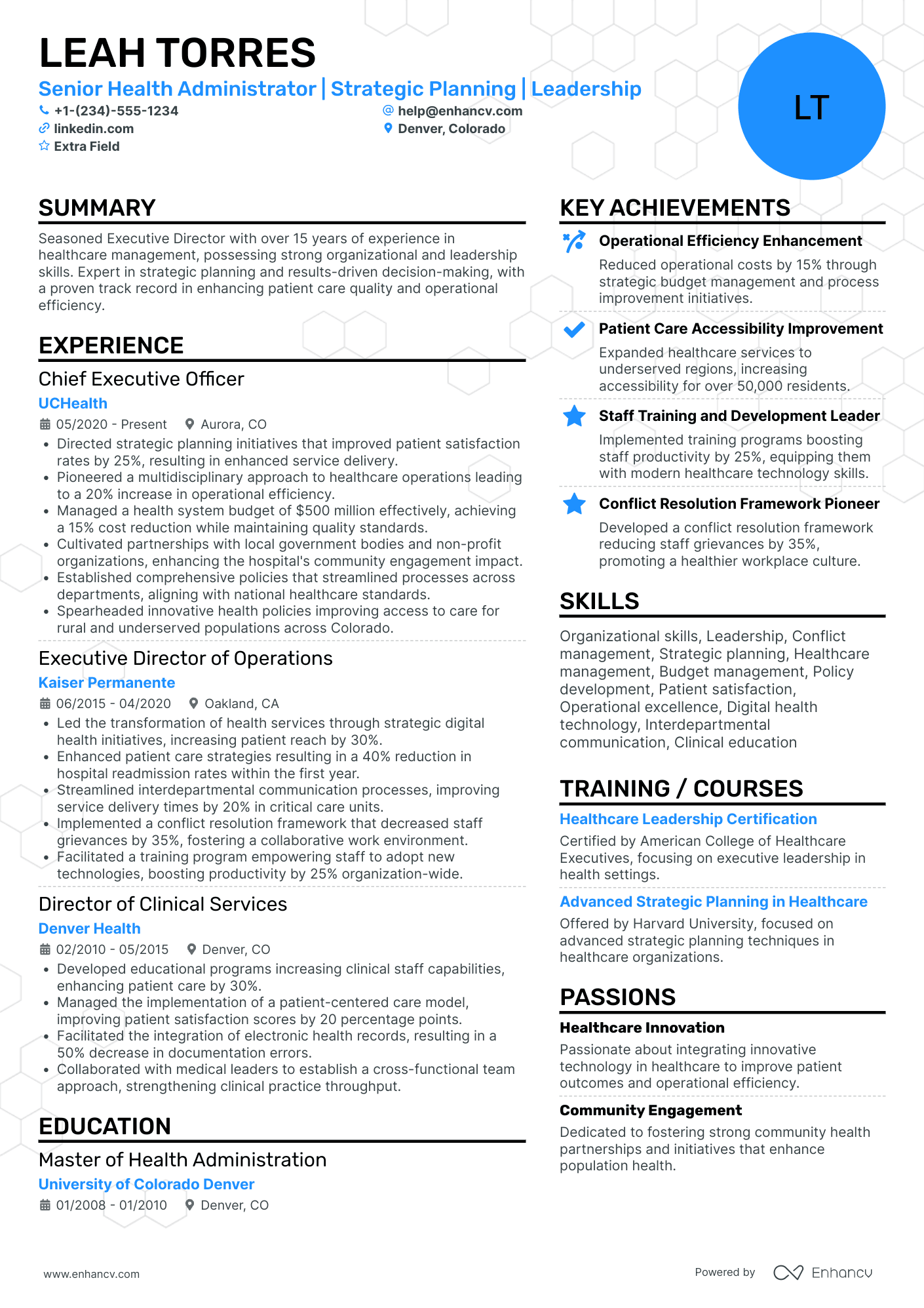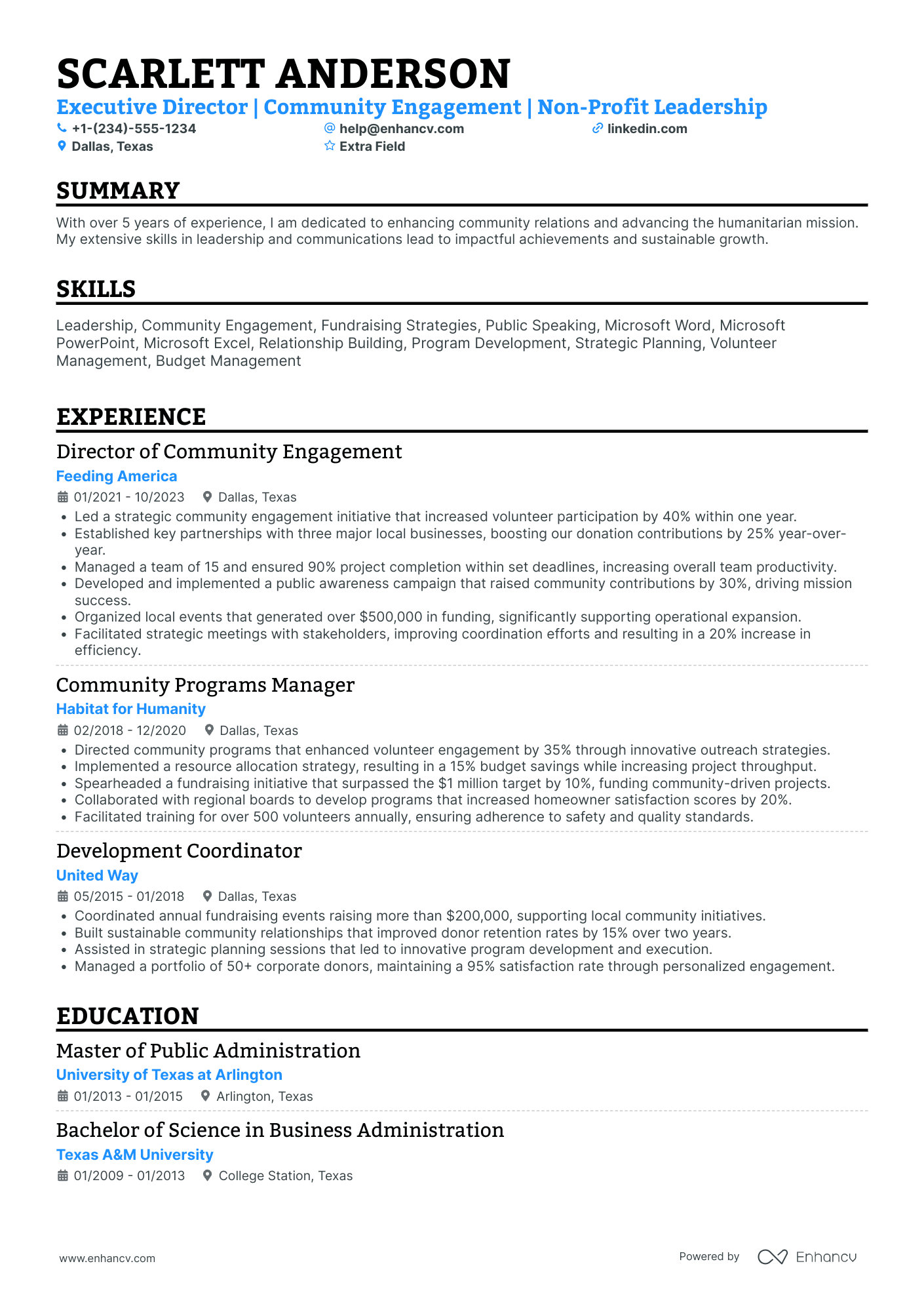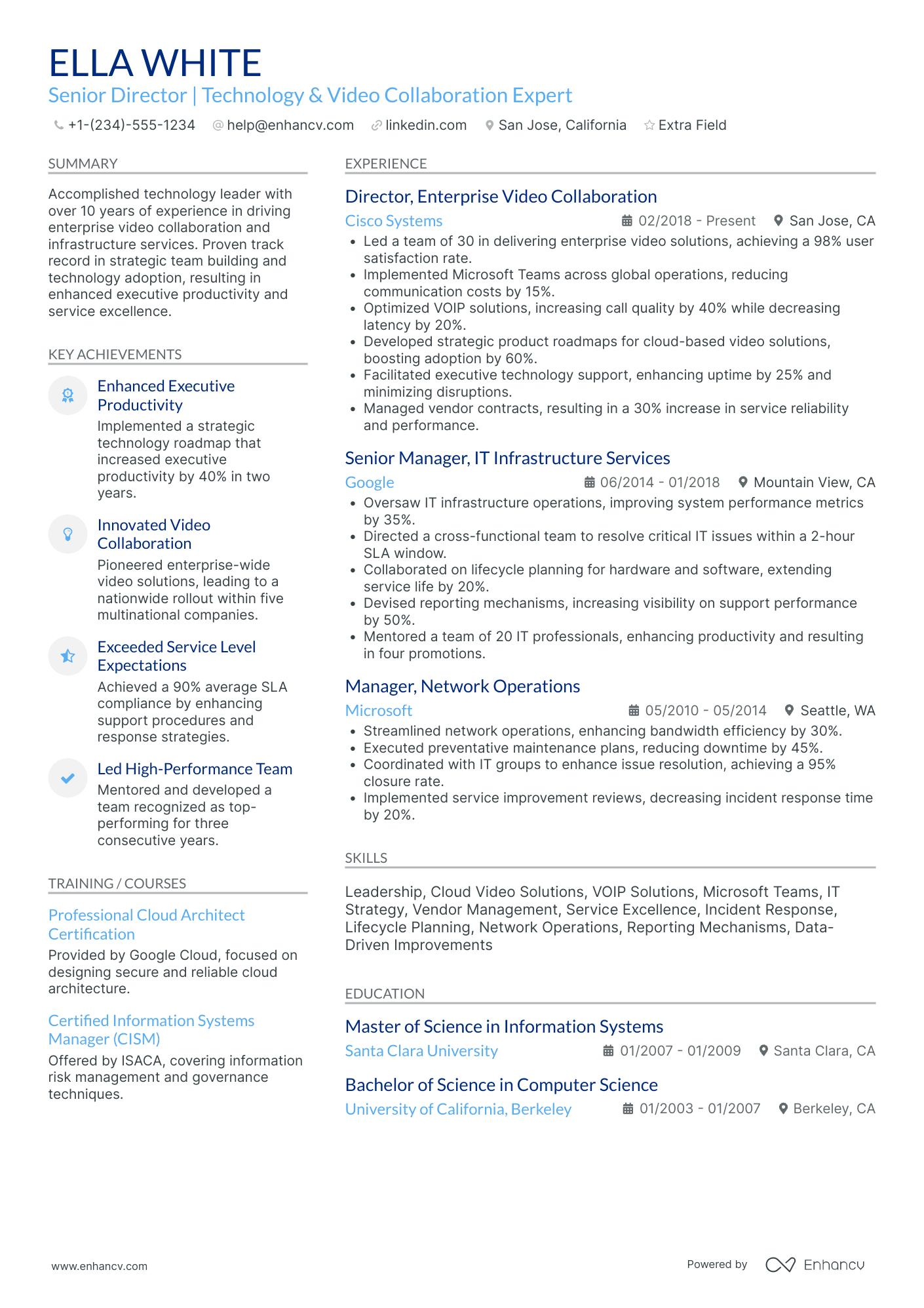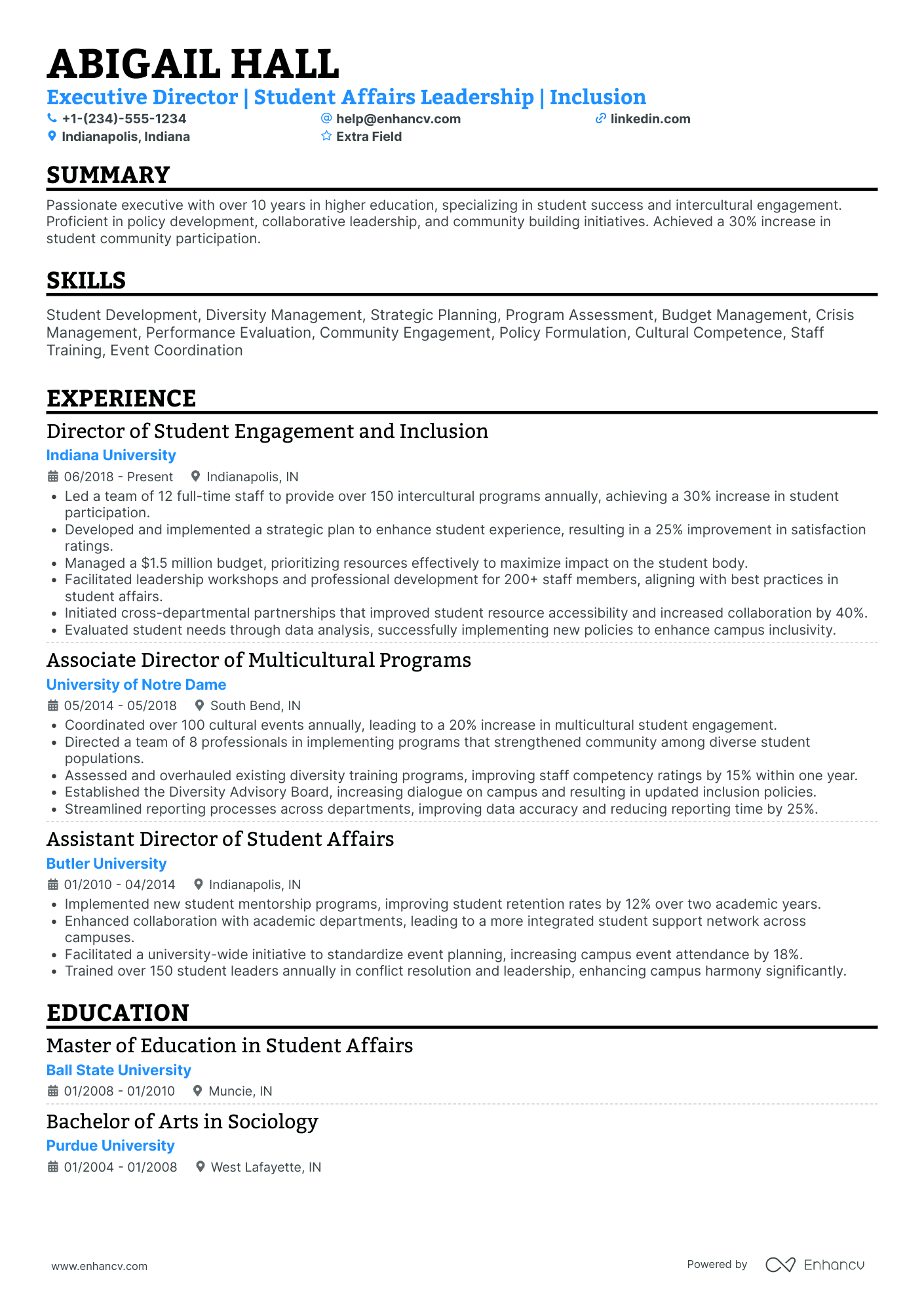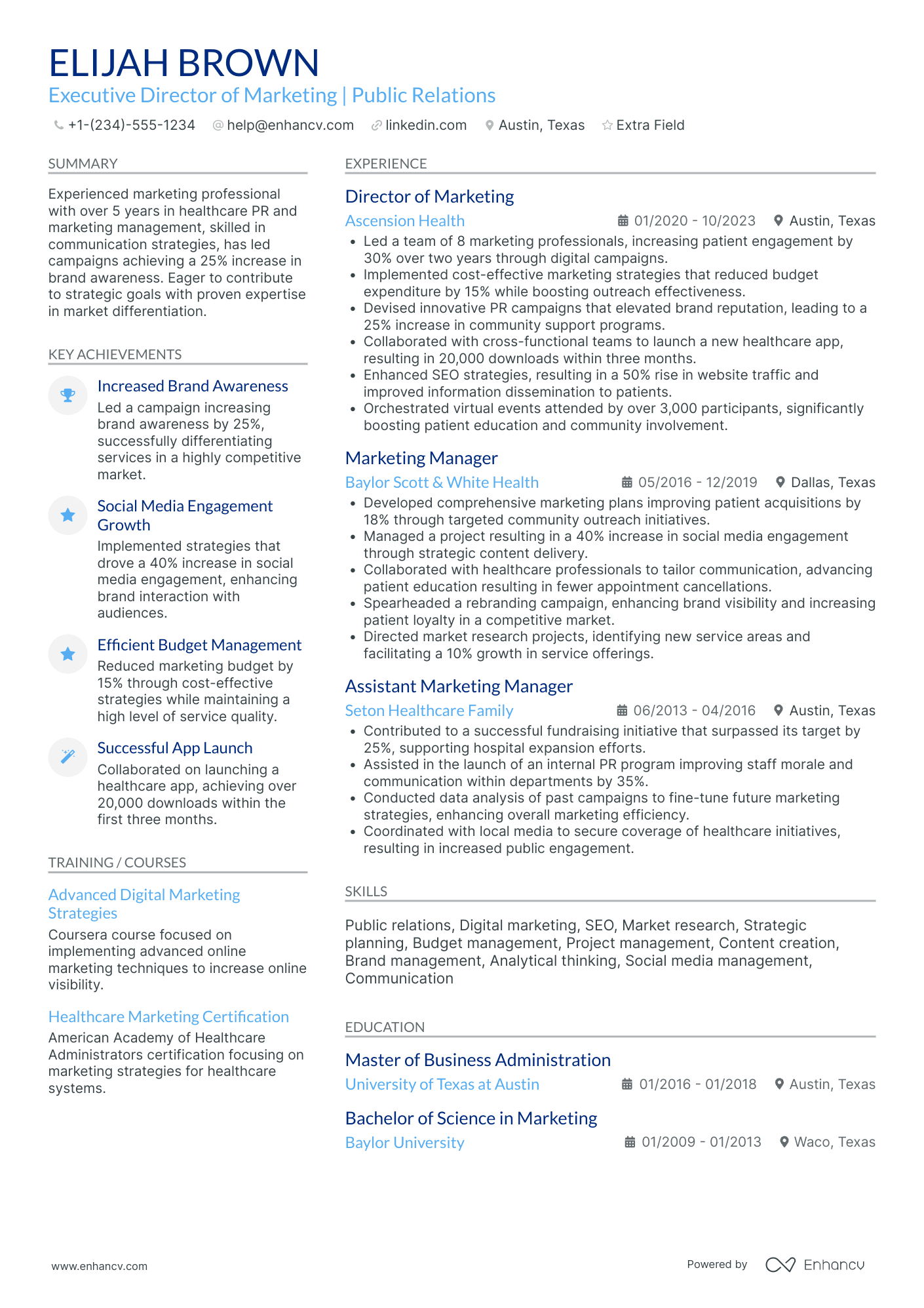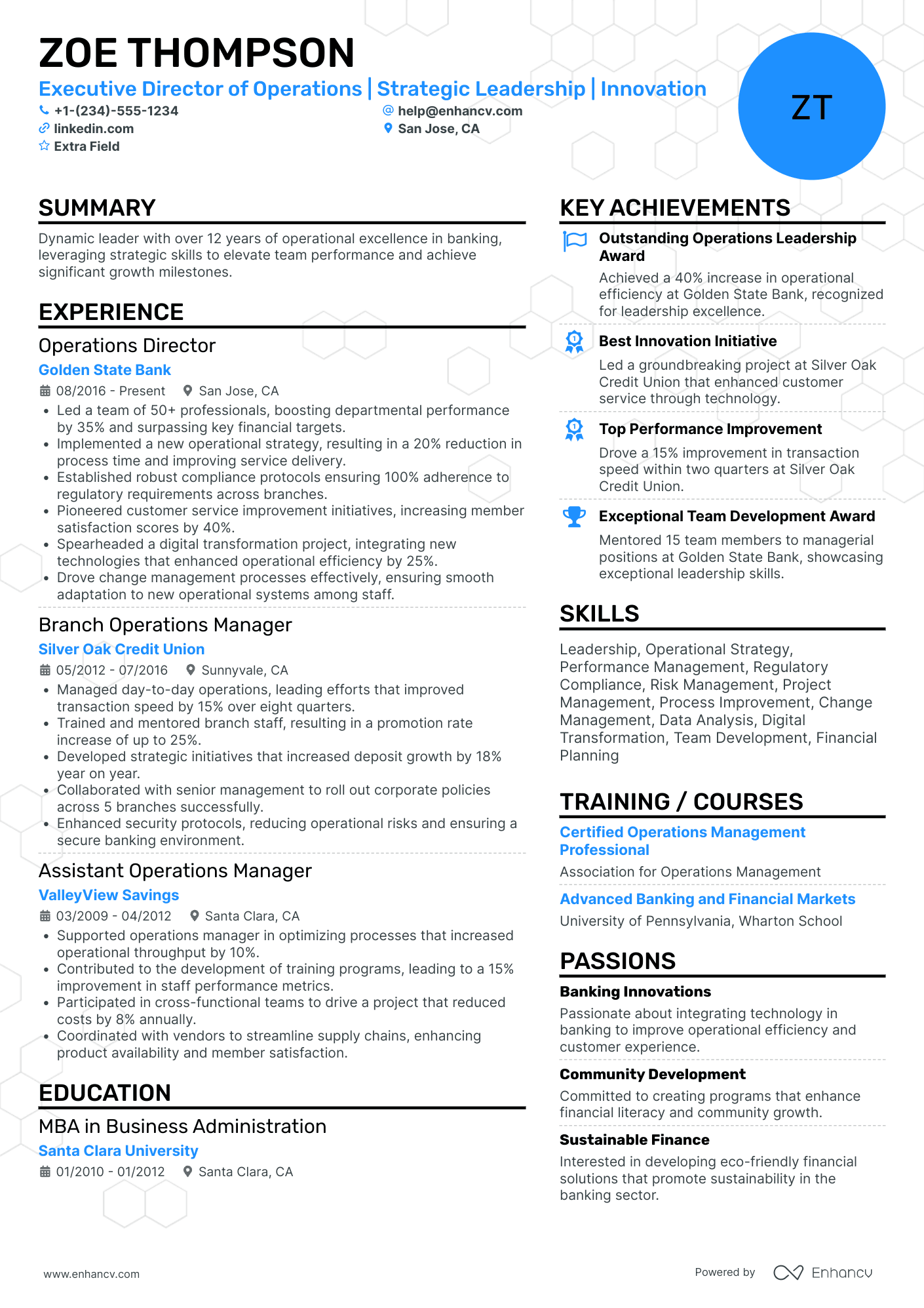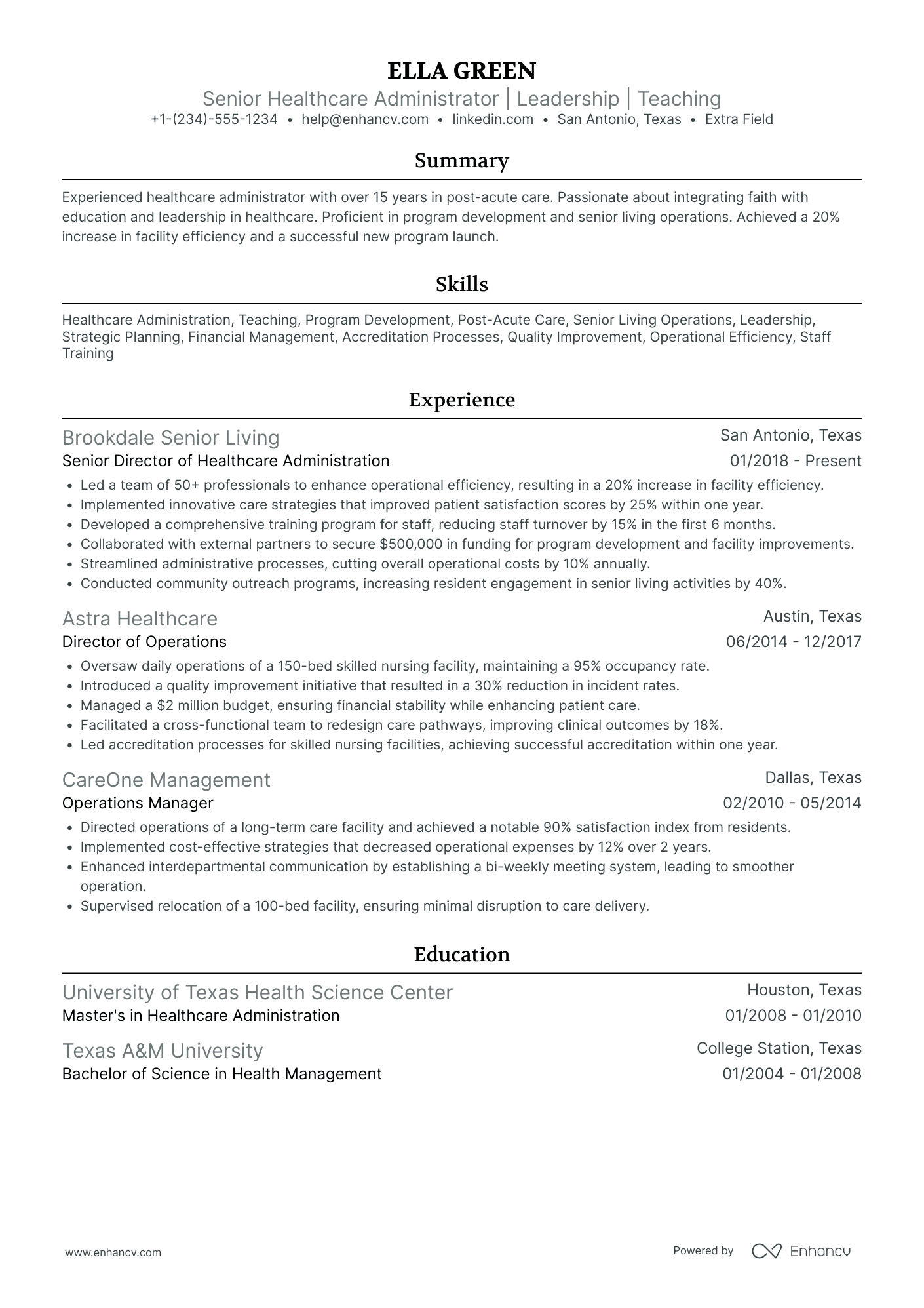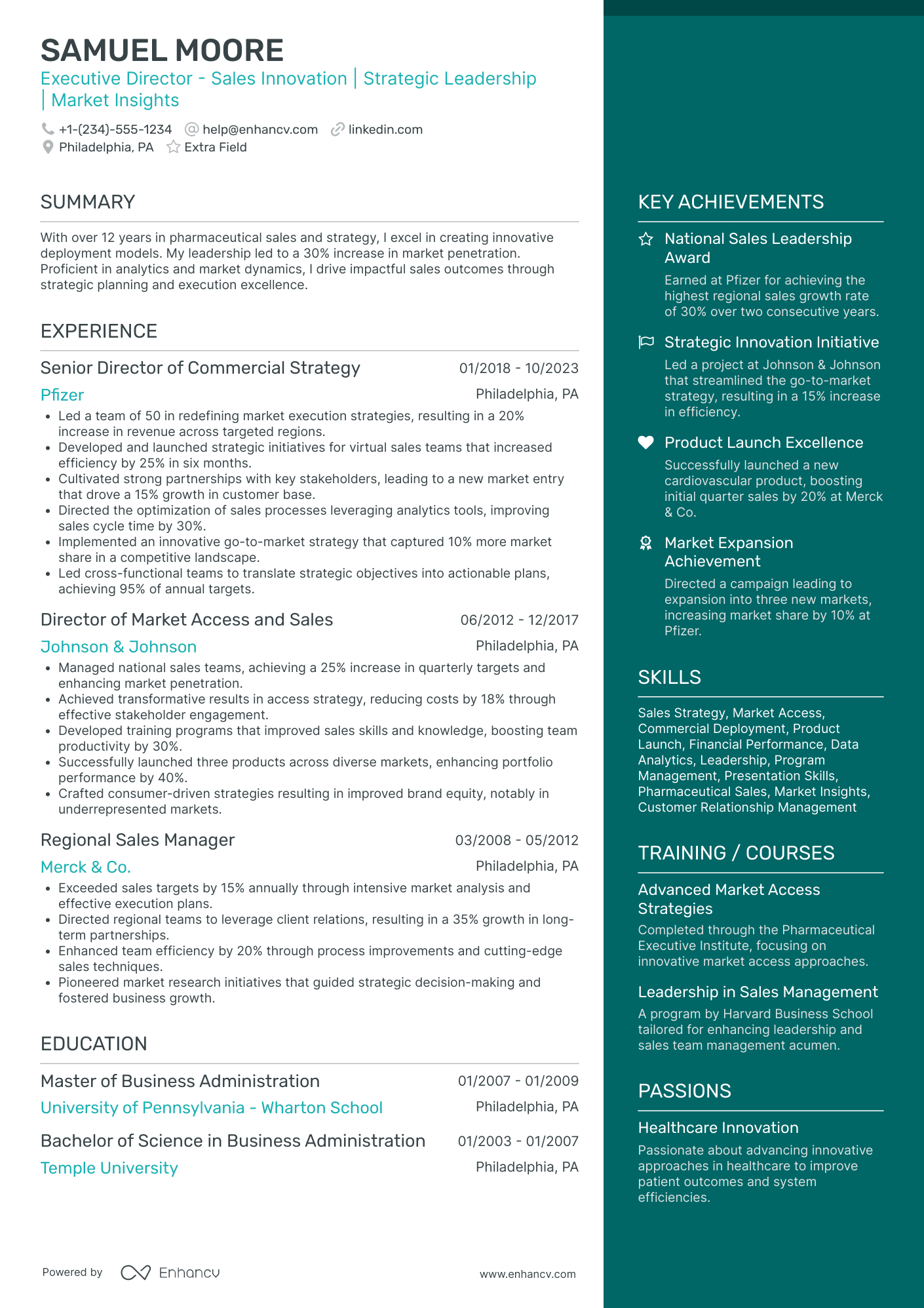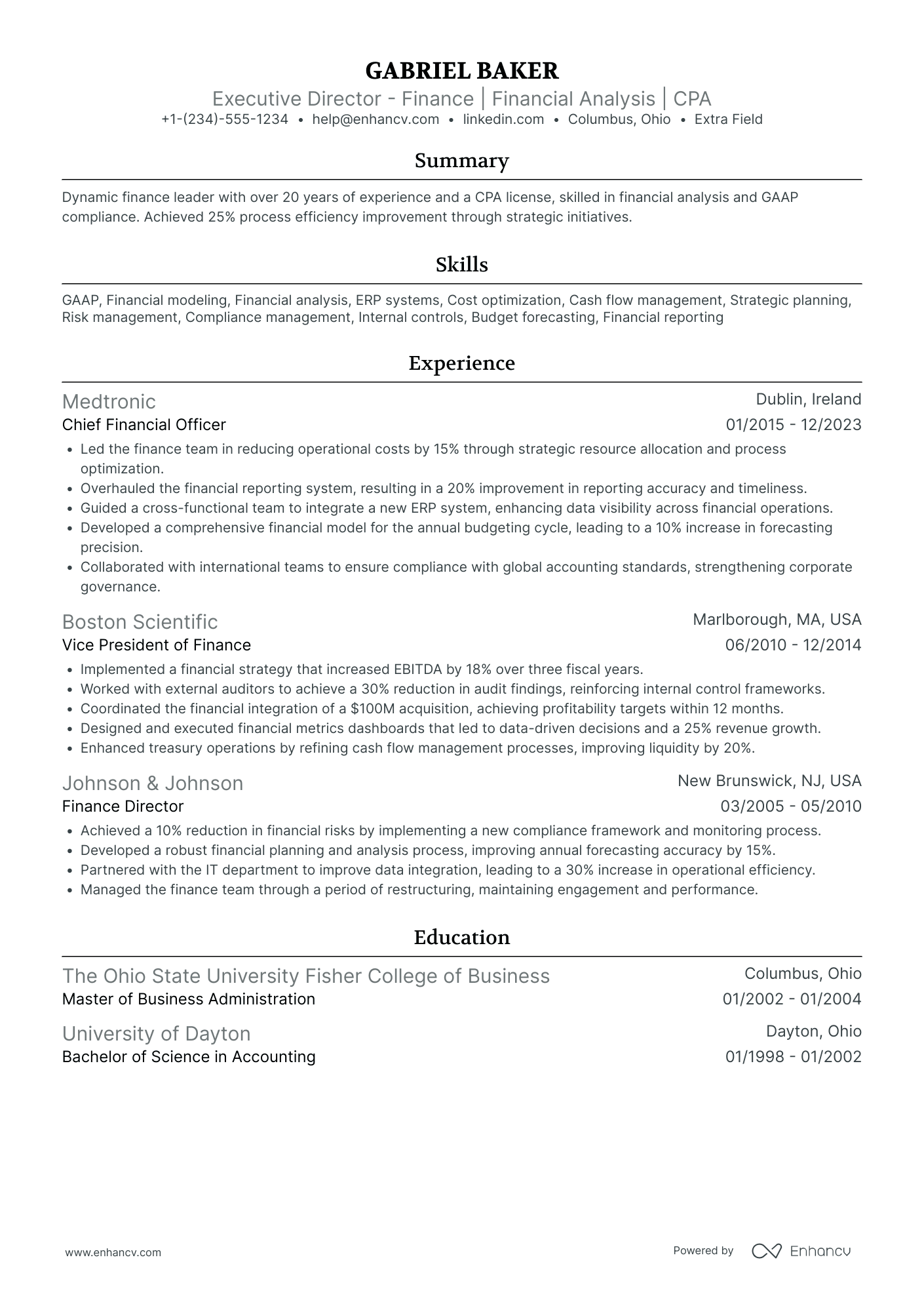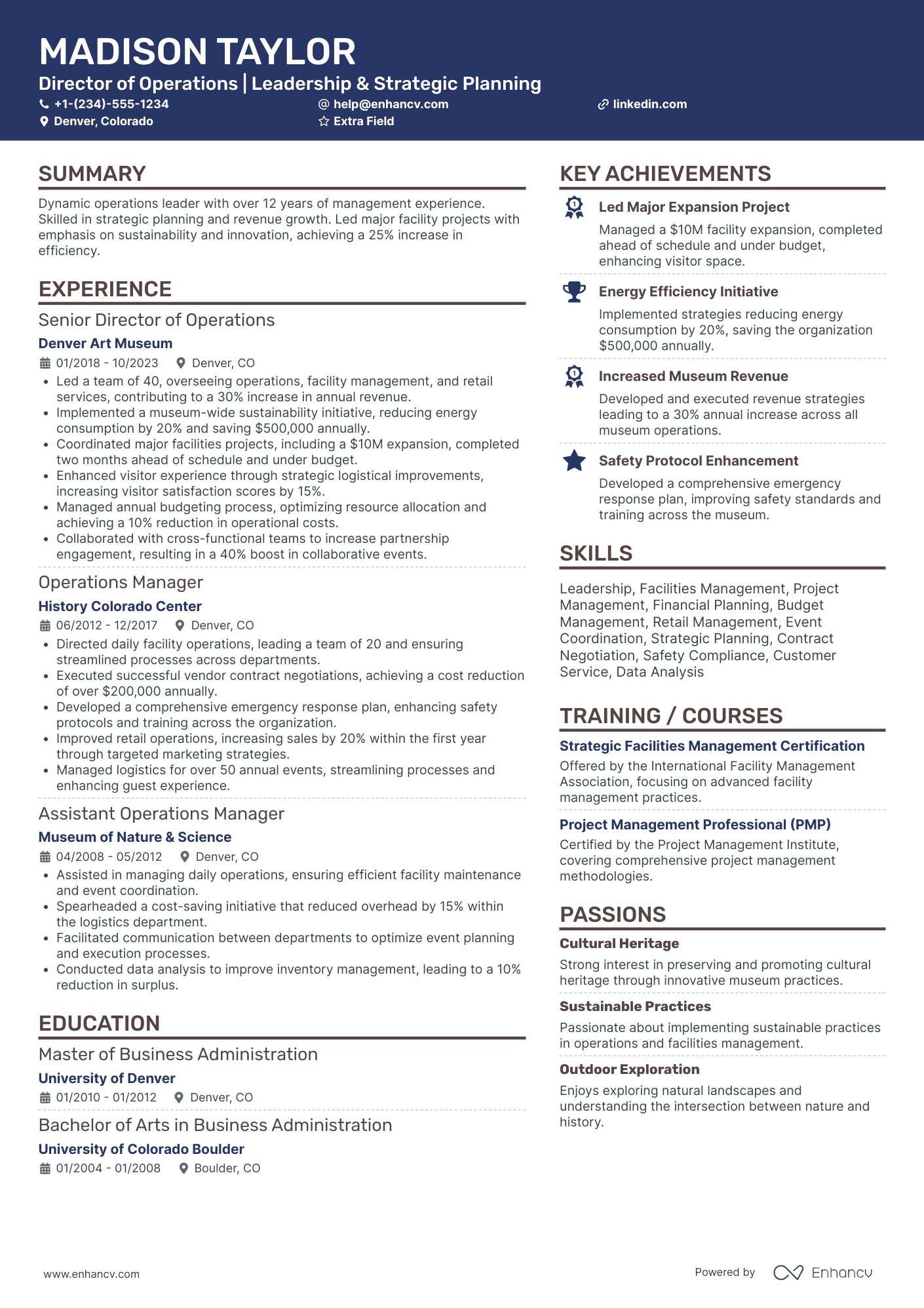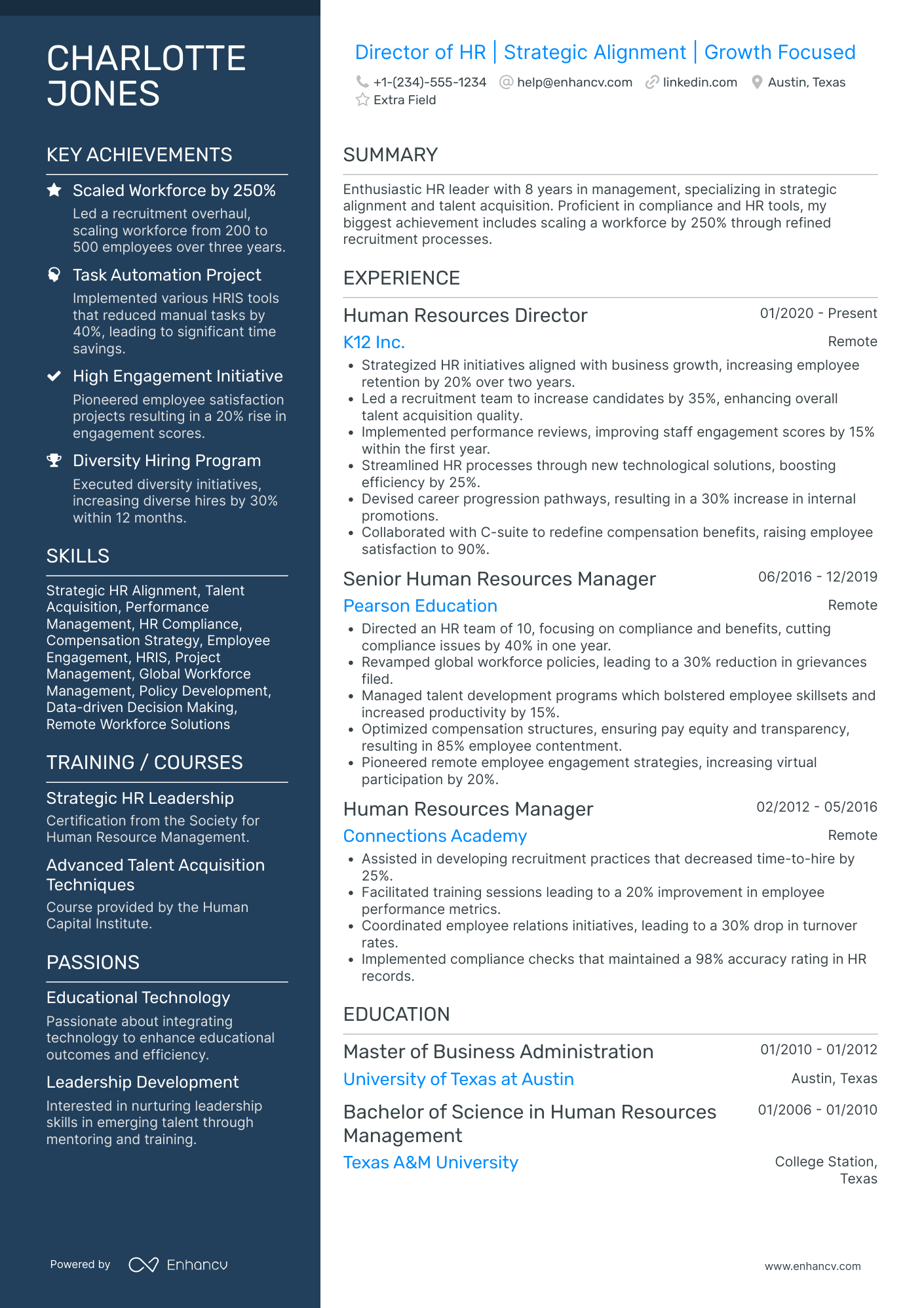pro
Crafting an executive director resume can feel like a delicate balancing act, especially in today’s fast-paced leadership landscape. With top executive roles projected to grow by 6% from 2025 to 2033—outpacing the average for other positions—the competition is intense. This role demands a blend of strategic vision, operational expertise, and the ability to lead organizations through complex challenges.
Your resume is the first opportunity to underline how your leadership has driven success, fostered growth, and sparked innovation. It’s crucial to present your achievements in a way that aligns with the specific needs of each organization. While the process can be challenging, the demand for skilled leaders remains strong, particularly in sectors such as technology, healthcare, and finance.
Leadership is not about being in charge. It’s about taking care of those in your charge.
Simon Sinek
This guide provides strategies to link your past accomplishments with your future vision, allowing your leadership abilities to thrive in any organization you lead.
Key takeaways
- Craft your resume for an executive director with a clear, streamlined format, positioning key leadership roles and accomplishments prominently at the top.
- Underscore specific achievements with measurable outcomes to emphasize your strategic impact on organizational growth and performance.
- Tailor your resume to the role by integrating relevant keywords and focusing on experience that aligns with executive leadership responsibilities.
- Show your expertise with industry-specific tools, systems, and certifications, reflecting your proficiency in high-level decision-making.
- Include major initiatives, board memberships, and affiliations to demonstrate your influence and active participation in shaping the direction of your field.
To get started, let’s review a practical executive director resume example to break down the key elements and best practices for crafting a strong leadership profile.
Executive director resume sample
For executive directors with tight schedules, the example resume below offers a quick and adaptable template. If time is limited, our Enhancv resume builder provides a fast way to craft a professional resume.
Michael Anderson
Executive Director
michael.anderson@email.com | LinkedIn: michael-anderson-executive | Chicago, IL
Summary
Dynamic and results-driven executive director with over 15 years of experience in leading organizations through strategic growth, operational excellence, and transformational leadership. Proven ability to steer companies to new heights by implementing long-term strategies, optimizing resources, and fostering high-performance cultures. Adept at building stakeholder relationships and aligning business goals with innovative initiatives that drive both growth and sustainability.
Experience
Executive Director
Habitat for Humanity, Chicago, IL
August 2016 – Present
- Lead the strategic direction and operational management for Habitat for Humanity's regional office, with over 100 employees and a $25M annual budget.
- Developed and executed multi-year strategic plans to grow volunteer engagement, increase housing projects, and ensure financial sustainability.
- Built strong relationships with key stakeholders, including donors, local government, and corporate sponsors.
- Managed budgeting, financial reporting, and compliance to align with organizational goals and donor expectations.
- Spearheaded successful fundraising campaigns, securing over $10M in new funding through partnerships and grants.
- Cultivated an inclusive workplace culture, increasing employee engagement and retention by 20%.
Director of Operations
United Way, Chicago, IL
June 2010 – July 2016
- Managed day-to-day operations for the regional office of United Way, overseeing 150 employees across multiple departments.
- Implemented operational efficiencies that improved workflow by 25% and reduced administrative costs by 15%.
- Led cross-functional teams in the successful execution of community initiatives, expanding the organization’s outreach by 30%.
- Developed leadership and talent management programs, resulting in a 10% increase in internal promotions.
- Collaborated with the executive team to establish organizational policies, ensuring alignment across all branches.
Education
Master of Business Administration (MBA)
University of Chicago, Booth School of Business
Graduated: May 2008
Bachelor of Science in Business Management
University of Illinois, Urbana-Champaign
Graduated: May 2005
Certifications
- Certified Nonprofit Executive (CNE)
- Project Management Professional (PMP)
Skills
- Strategic leadership
- Operational management
- Fundraising & grant acquisition
- Stakeholder & board relations
- Budgeting & financial oversight
- Team development & leadership
- Change management
- Policy development & compliance
Languages
- English (Native)
- French (Fluent)
- Spanish (Fluent)
Let’s explore how to organize your executive director resume to highlight your leadership skills and achievements effectively.
How to format an executive director resume
At a high-level position like executive director, your resume layout needs to be flawless. We’ve compiled key tips on everything—from structure to file naming.
Resume format
For an experienced executive director, the reverse-chronological format works best. It draws attention to your most recent accomplishments first, giving a clear picture of your leadership journey and featuring your most impactful achievements right at the top.
Resume design
- As an executive director, conciseness is key, so aim for a clean one-page format. However, with over 10 years of experience, a two-page resume is perfectly acceptable to detail your leadership achievements.
- Maintain 0.5"-1" margins on each side for readability. Thus, it will be more concise.
- A two-column layout can help present your experience clearly, saving space and remaining ATS-friendly.
- Use smooth colors and simple fonts to make your resume stand out without distracting from your expertise.
Contact information
- Your resume header should include your name, title, email, phone number, and LinkedIn profile.
- Make sure your title aligns with the executive director position you're pursuing.
- Skip photos for a more professional appearance.
Consider the local standards – Canadian resumes, for example, may have a different format.
PRO TIP
When crafting your executive director resume, focus on aligning your experience with the job description rather than worrying about fonts or layout—ATS systems aren’t affected by those. Instead, ensure consistency in date formats, bullet points, and keywords to improve your chances of getting through.
File formatting
- Avoid confusion by keeping your file name simple, like Michael_Anderson_ExecutiveDirector.
- PDF is best to ensure your resume stays intact, but always check the job description in case another format is required.
Top sections on an executive director resume
Your resume should include these essential sections:
- Work Experience
- Key Skills
- Education and Qualifications
- Professional Summary
- Additional sections such as Achievements or Projects
We’ll dive into these sections further below.
Think your resume is perfect? Run it through the Enhancv resume checker and see how it stacks up!
Is your resume good enough?
Drop your resume here or choose a file. PDF & DOCX only. Max 2MB file size.
With the format looking good, let’s focus on how to underline your experience the right way.
How to write your executive director resume experience
The role of an executive director is full of challenges and demands a high level of responsibility.
In this position, you’ll be required to:
- Work closely with senior leaders and department heads to develop strategies, drive initiatives, and ensure alignment with organizational objectives.
- Uphold compliance with corporate policies, governance standards, and legal requirements, while fostering a culture of transparency and responsibility.
- Manage operations, long-term planning, and budgeting to effectively steer programs and drive success.
- Offer guidance in critical decision-making, shaping the organization’s direction, and ensuring sustainable growth.
Instead of managing daily operations, your focus will be on big-picture strategies, requiring thoughtful decision-making and leadership. Your experience section should showcase how you’ve tackled the complexities of organizational guidance, made strategic decisions, and handled the shifting challenges that come with guiding an organization. Emphasize your skills in mediation, strategic thinking, and empathetic leadership.
The right way to build a targeted resume for an executive director
To land your desired executive director role, it's essential to tailor your resume to each job. This means aligning your experience with the specific job description and incorporating relevant keywords to accent your fit for the role.
Now, let’s explore a real executive director job description for more tailored guidance.
Executive Director
Job description
Keystone Science School (KSS) offers year-round outdoor educational programs, attracting students from Summit County and the Denver Metro area for hands-on learning and summer camp experiences.
Key selection criteria
The ideal candidate will also demonstrate, through successful past experience, the ability to:
- Develop, execute, and evaluate strategic and business plans for nonprofit organizations and initiatives.
- Implement and oversee an enterprise risk management system/process aligned with the strategic and business plans.
- Fundraise through relationship-building with philanthropic partners and direct asks of major gift donors.
- Lead major capital campaigns and associated construction projects;
- Manage and mobilize a nonprofit board of directors.
- Manage and mentor a team of senior staff
- Articulate an advanced understanding of and personal commitment to issues related to justice, equity, diversity, and inclusion.
- Set, control, and report approximately $2 million or more in annual operating budgets.
- Communicate with the public and advocate the importance of nature, experiential education, and youth development.
- Build and sustain partnerships with schools, government, and community leaders.
- Think big and creatively about what's possible, to craft and articulate an inspiring vision, and to motivate others to achieve ambitious goals.
Scope and responsibilities
Specific responsibilities include the following:
Strategic leadership
- In partnership with the board, craft a compelling vision for the future of KSS and inspire staff and stakeholders toward the achievement of its ambitious aims.
- Lead the development, approval, and implementation of a new three- to -five-year strategic plan with key objectives, and timelines for their completion, clearly spelled out.
- In support of the strategic plan, lead the development and execution of a master plan and corresponding campaign to ensure KSS has the facilities and resources to achieve its objectives.
- Continually manage strategic priorities and articulate these to both internal and external audiences.
- Develop and gain approval of annual goals in partnership with the Leadership Team and measure and report on annual goals monthly.
- Ensure the mission and vision are clearly articulated and incorporated into all aspects of KSS programming, culture, and operations.
- Champion the JEDI statement and support the JEDI commission in creating a more just, equitable, diverse, and inclusive organization.
Board development
- In partnership with the Governance Committee Chairperson, maintain a diverse and dynamic cadre of members.
- Fundraise with board members to support overall fundraising targets and donor development.
- In partnership with the Board Chairperson, facilitate engaging, insightful, and efficient meetings and reports.
Staff management
- Guide, mentor, and support Leadership Team members to maximize each individual’s potential and contribution.
- Monitor Leadership Team performance by setting goals, establishing evaluation criteria, and conducting annual reviews.
- Manage and support the Director of Human Resources and Equity in cultivating a culture of high performance and continuous improvement that values learning and a commitment to quality.
- Ensure KSS as a workplace is accountable to best practices, policies, and procedures.
- Provide leadership and direction to ensure that health, safety and environment protection requirements are met for both staff and campers.
Resource development
- As the primary fundraiser for individual giving at KSS, personally seek major gift donations (over $5,000) to support the annual fund, endowment fund, and scholarship funds in cooperation with the Director of Development.
- The Executive Director will also ensure the integrity of all land and capital assets. When necessary, will lead fundraising and capital campaign efforts to assure the upkeep of the campus facilities, services and buildings.
- Develop and lead major capital construction campaigns and the capital construction projects with the assistance of the Board and select members of the leadership team.
- Manage and support the Director of Development in ensuring annual fundraising targets are met.
- Manage and support the Director of Marketing and Strategic Partnership in ensuring annual tuition and ancillary income targets are met.
- Develop and maintain relationships with funders (individuals, foundations, corporations);
- Build rapport and strengthen the reputation of KSS with community leaders and organizations.
Financial management
- Develop and gain approval of a sustainable budget and manage it throughout the year, including regular updates to the board.
- Manage and support the Director of Finance in ensuring financial literacy of staff and training in budgeting protocols.
- Ensure an annual audit or review of KSSs financial statements is completed, accurate, and reviewed by the board.
- Provide financial data to board members and external audiences to ensure transparency.
- Propose and gain approval for annual surplus reinvestment (if applicable) to build reserve funds and ensure the long-term financial health of the organization.
Risk management
- In partnership with the Director of Education and Board of Directors, oversee and approve risk management policies and procedures.
- Participate in regular scenarios to test and improve KSSs ability to react in emergencies.
- Ensure KSS risk management policies and procedures are compliant with state and federal standards to maintain safety of staff, students, and teachers.
Personal / professional attributes
- Passionate about outdoor education and the transformational impact of camp experiences on the lives of children
- Strategic, visionary, and a big-picture thinker combined with a willingness to roll up sleeves and get hands dirty
- A clear communicator with a transparent leadership style and approachable demeanor
- Business savvy, entrepreneurial, and a creative problem-solver
- Authentically enthusiastic and unendingly optimistic, even when faced with adversity
- A person of unwavering personal integrity with ethics beyond reproach.
Check out this experience section tailored specifically for the job offer:
- •Developed and executed strategic plans that aligned organizational goals, resulting in a 25% increase in overall efficiency.
- •Led capital campaigns, securing over $5M in major gift donations to support facility expansions and scholarship programs.
- •Mentored senior staff to build a high-performance team, driving continuous improvement and employee development.
- •Collaborated with the board of directors to enhance governance, ensuring strong oversight and effective decision-making.
- •Spearheaded JEDI initiatives, ensuring they were fully integrated into organizational operations and culture.
- •Managed and optimized a $2M operating budget, maintaining financial sustainability and long-term growth.
It's impactful because it:
- Demonstrates leadership in strategic planning and driving organizational growth, aligning with the role’s focus on achieving long-term objectives.
- Puts the focus on the success in leading capital campaigns and securing major donations, showcasing vital fundraising and resource development expertise.
- Underscores experience in mentoring senior staff and boosting team performance, reflecting essential leadership and management skills.
Show your impact by quantifying your achievements in the next section.
How to quantify your experience on resume
As an executive director, quantifying your results is vital to illustrating your impact. Draw attention to specific achievements, such as improving program reach or raising significant funds, to clearly show your contributions. This enhances your credibility with board members, donors, and other key stakeholders.
If you can’t measure it, you can’t improve it.
Peter Drucker
Here's how you can approach numbers on a resume:
- Quantify how much you increase fundraising revenue, specifying the percentage or dollar amount raised annually.
- Highlight operational efficiency improvements, such as reducing overhead costs by a specific percentage or dollar figure.
- Detail the growth in the number of strategic partnerships formed and the resulting financial impact on the organization.
- Include the exact amount of capital secured through major donor campaigns or grants, and the percentage growth year over year.
- Specify how you expanded program reach, mentioning the percentage increase in participants or geographic areas covered.
Not having held an executive director title yet doesn’t mean you’re not ready to lead. Underline how your previous roles have prepared you to excel as an executive leader.
How to show a career progression on an executive director resume
If you're aiming for an executive director role but haven’t officially held that title, don’t worry. Even without direct experience, your career path can show how your previous roles have prepared you for this promotion.
Many candidates are in the same position, so it’s important to outline how your responsibilities have grown, the leadership skills you’ve developed, and examples of leading teams or initiatives.
Here’s how to highlight your career growth for such a role:
- Showcase your progress: Even if you haven’t been an executive director, underscore how your responsibilities have grown over time. Have you managed major projects, led teams, or handled important initiatives? These examples show you're ready for a senior leadership role.
- Focus on leadership abilities: Key skills like strategic thinking, team management, budgeting, and communication are crucial for an executive director. Provide examples from past roles where you've developed these skills, even if it wasn’t in a formal leadership position.
- Demonstrate your readiness for bigger responsibilities: Share specific examples where you took the lead and showed you can handle executive tasks. Whether it was driving organizational change, improving systems, or contributing to company growth, these examples show you're prepared for high-level decisions.
- Emphasize relevant roles: Even if your previous jobs weren’t executive titles, highlight roles where you gained valuable experience for leadership. Positions like Director, Operations Manager, or Program Leader can demonstrate that you've built a strong foundation for an executive director position.
Knowing hard and soft skills is important, so let’s explore how to include them in your executive director resume.
Executive director skills on a resume
As an executive director, managing stakeholder relationships and navigating changing challenges is key. Your resume's skills section should underscore leadership, fundraising, and proficiency with industry-specific tools or software.
Tailor this section to match the job description you’re applying for, and ensure your skills are authentic, as they’re often tested.
Consider including the following hard skills:
Best hard skills for your executive director resume
- Salesforce
- Microsoft Office Suite
- Budgeting
- QuickBooks
- Google Workspace
- Asana
- Slack
- Zoom
- DonorPerfect
- Blackbaud
- Microsoft Dynamics 365
- Dropbox
- Constant Contact
- Adobe Acrobat
- Trello
- HubSpot
- Sage Intacct
- Eventbrite
- DocuSign
Your soft skills should be woven into your resume summary or experience section. As an executive director, you’re expected to possess strong leadership, communication, and problem-solving abilities, so use specific examples to showcase these.
Executive directors today face growing expectations to balance multiple priorities such as ethical leadership, stakeholder engagement, and innovation. As organizations shift towards flatter structures, leaders must adapt by fostering collaboration and empowering teams.
Effective leadership in 2023 also requires developing others through mentorship, focusing on employee retention, and preparing for leadership transitions. With technology and workplace dynamics evolving, an adaptable, empathetic, and innovation-driven leadership style is crucial for success.
Best soft skills for your executive director resume
- Strategic thinking
- Leadership
- Communication
- Problem-solving
- Decision-making
- Adaptability
- Emotional intelligence
- Conflict resolution
- Team building
- Negotiation
- Time management
- Collaboration
- Empathy
- Public speaking
- Change management
- Mentoring
- Financial acumen
- Crisis management
PRO TIP
Always be honest about your achievements—they can be easily verified.
After listing your skills, add your education and certifications to boost your qualifications.
How to list your certifications and education on your resume
A degree in engineering, business, or a related field can strengthen your candidacy as an executive director. Advanced education is crucial for executive leadership, combining strategic insights with essential decision-making skills.
It not only enhances your qualifications through recognized degrees and certifications but also broadens your professional network. Additionally, it equips leaders to steer organizations with a strong emphasis on ethical decision-making, cultural competence, and effective management of diverse teams.
Here’s how to present this section:
- List your degree and major (e.g., Master’s in Business Administration).
- Feature your educational institution to emphasize the quality of your education.
- Mention your graduation year to provide context, omitting the specific month.
- Include coursework relevant to leadership and management, such as Strategic Planning, Organizational Leadership, or Ethics in Business.
- If you received honors such as Dean's List, Cum Laude, or scholarships, be sure to mention these achievements in your application.
Now, let’s align your education entry with the executive director job ad we mentioned above.
- •Focused on strategic leadership, organizational behavior, and financial management.
- •Completed a thesis on executive leadership and organizational transformation in evolving markets.
- •Specialized in business management, leadership, and ethical decision-making.
- •Completed a capstone project on the impact of corporate social responsibility on brand reputation.
This education entry outlines the candidate’s strong fit for an executive director role with:
- Relevant degrees: MBA and BA in Business Administration, focused on leadership and strategy.
- Skills highlighted: strategic leadership, organizational behavior, financial management, corporate social responsibility.
- Specific details: institutions, study dates, thesis on leadership.
- Aligns with executive needs: aligns with executive responsibilities and leadership requirements.
Including a certifications section on your resume shows your commitment to growth as an Executive Director, beyond daily responsibilities. Tailor your certifications to match the specific industry needs of the job you're applying for.
Best certifications for your executive director resume
Now that we've covered education and certifications, let’s shift our focus to crafting a powerful executive director summary.
How to write your executive director resume summary
When creating a resume for an executive director position, the aim is to capture the attention of decision-makers who are familiar with leadership challenges. Your resume summary should be concise yet powerful, showing your qualifications and fit for the role.
Here's how to structure it:
- Summarize your executive leadership experience and key strengths in three to five sentences.
- Use leadership-focused language to highlight your expertise in strategic planning and governance.
- Include measurable accomplishments like revenue increases, organizational improvements, or successful initiatives.
- Mention relevant advanced degrees or certifications to support your credibility.
- Show how your leadership can drive the organization's vision, growth, and overall success.
Here’s an example executive director summary tailored to the role above.
This summary works well because it directly addresses the key requirements in the job posting. It emphasizes the candidate's deep experience in nonprofit leadership, outdoor education, and youth development, focusing on strategic planning, fundraising, and board management.
The inclusion of justice, equity, diversity, and inclusion reflects the job's core responsibilities, while also showcasing success in overseeing large budgets and capital campaigns.
Now, let’s explore additional sections to further boost the effectiveness of your resume.
Additional sections for an executive director resume
Consider enhancing your executive director resume with additional sections to prove your well-rounded capabilities. Your leadership experience is already impressive, but these optional sections can elevate your profile.
Here are our suggestions:
- Recognition and awards: Highlight any awards or accolades you’ve received for your leadership in nonprofit management or community engagement.
- Professional memberships: Include memberships in professional organizations like the Nonprofit Leadership Alliance or the Association of Fundraising Professionals (AFP) to demonstrate your commitment to the field.
- Language skills: Write any additional languages you speak, underlining your ability to engage with diverse communities and stakeholders, and manage a multicultural team effectively. This can enhance your ability to build partnerships and communicate across various cultural contexts.
- Volunteering: Mention relevant volunteer work that showcases your passion for outdoor education, youth development, or community service.
- Personal interests and passions: Share hobbies like hiking or swimming, reflecting your alignment with the organization’s mission and your leadership style.
These sections can further underscore your unique strengths and passions, helping you stand out as a dynamic executive director candidate.
In conclusion
Our guide assists people transitioning into an executive director role, emphasizing the importance of tailoring resumes to feature transferable leadership skills and relevant experiences. It recommends focusing on key accomplishments, clearly demonstrating strategic vision, fundraising success, and team management abilities.
Executive Director resume examples
By Experience
Assistant Executive Director
Junior Executive Director
Senior Executive Director
Vice Executive Director
Interim Executive Director
Deputy Executive Director
Associate Executive Director
Co-Executive Director
By Role
